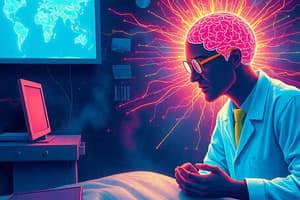Podcast
Questions and Answers
What is the recommended maximum number of ECT sessions for a patient?
What is the recommended maximum number of ECT sessions for a patient?
- 100 times
- 10 times
- 25 times (correct)
- 50 times
What is the mortality rate for ECT?
What is the mortality rate for ECT?
- 0.1-0.4% (correct)
- 20-30%
- 1-2%
- 5-10%
What is the potential complication of administering the relaxant incorrectly during ECT?
What is the potential complication of administering the relaxant incorrectly during ECT?
- Fracture (correct)
- Brain damage
- Confusion
- Headache
What is the most common type of ECT?
What is the most common type of ECT?
What are some of the indications for ECT?
What are some of the indications for ECT?
What are some of the contraindications for ECT?
What are some of the contraindications for ECT?
How many ECT treatments are usually administered per week?
How many ECT treatments are usually administered per week?
What is the exact mechanism of action of ECT?
What is the exact mechanism of action of ECT?
What are some of the phases of ECT?
What are some of the phases of ECT?
Who is part of the ECT team?
Who is part of the ECT team?
What is the nurse's role in ECT?
What is the nurse's role in ECT?
Flashcards are hidden until you start studying
Study Notes
Electroconvulsive Therapy (ECT) in Psychiatry
- ECT can be bilateral or unilateral, with bilateral being the most common, effective, and associated with more cognitive dysfunction.
- ECT is indicated for severe depression, resistant depressive disorder, suicidal attempts, mania, acute catatonic schizophrenia, and schizoaffective psychosis.
- Contraindications include increased intracranial pressure, severe cardiovascular or pulmonary disease, active bone disease or musculoskeletal injuries, and severe anxiety disorders.
- The number of treatments varies by case, with an average of 6-10 treatments, and treatments are usually administered three times per week, not exceeding 25 times per episode.
- The exact mechanism of action of ECT is unknown, but it is believed to affect neurotransmitters such as serotonin, norepinephrine, and dopamine.
- ECT theories of action include punishment, life-threatening experience, release of aggressive impulses, minimal brain damage, and compensation for malfunctioning electric circuits in the brain.
- The phases of ECT include the cry phase, tonic phase, clonic phase, and recovery phase.
- The ECT team includes a psychiatrist, anesthesiologist, trained nurses, nurse aids, and an ECT assistant.
- The nurse's role in ECT includes pre-ECT care such as obtaining informed consent, completing physical exams and tests, reducing patient anxiety, and preparing necessary equipment and medication.
- During ECT, the nurse's role includes reassurance and support, drug administration, preventing falls or fractures, and post-seizure care.
- Side effects of ECT include headache, confusion, and temporary memory loss, while complications or risks may include brain damage, permanent memory loss, confusion, fracture, and rare instances of death.
- Ethical considerations in ECT include using the minimum number of treatments necessary, avoiding allowing patients to see or hear others receiving ECT, and avoiding considering ECT as a form of punishment.
Studying That Suits You
Use AI to generate personalized quizzes and flashcards to suit your learning preferences.




